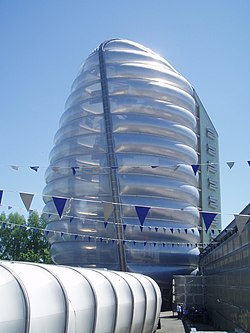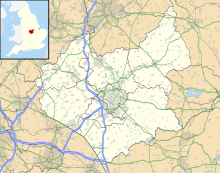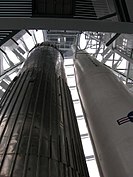National Space Centre
  National Space Centre | |
 Location of National Space Centre in Leicester | |
| Established | 2001 |
|---|---|
| Location | Belgrave, Leicester LE4 5NS |
| Coordinates | 52°39′13″N 01°07′56″W / 52.65361°N 1.13222°WCoordinates: 52°39′13″N 01°07′56″W / 52.65361°N 1.13222°W |
| Type | Space (and aerospace) museum |
| Website | National Space Centre |
The National Space Centre is a museum and educational resource covering the fields of space science and astronomy, along with a space research programme in partnership with the University of Leicester. It is located on the north side of the city in Belgrave, Leicester, England, next to the River Soar. Many of the exhibits, including upright rockets, are housed in a tower with minimal steel supports and a semi-transparent cladding of ETFE 'pillows'[1] which has become one of Leicester's most recognisable landmarks.
History[]
The building was designed by Nicholas Grimshaw, and it opened to the public on 30 June 2001.[2] The tower is 42 m (138 ft) tall and claims to be the only place to house upright space rockets indoors.[2]
University of Leicester[]
The centre arose from a partnership between the University of Leicester's Space Research Centre and local government agencies.[3] The total project cost was £52m, £26m of which came from a Millennium Commission grant, and the rest from private sector sponsors.[4] It is run as an educational charity,[5] and offers science workshops for school children of all ages.[citation needed]
The National Space Centre currently has post-doctoral science researchers based at the University of Leicester's Space Research Centre (SRC) and the University of Nottingham's Institute of Engineering Surveying and Space Geodesy (IESSG).[citation needed]
Main exhibits[]

The Centre has on display one of only three known Soyuz spacecraft in the West (there is one in France at the Cité de l'espace and another one in the United States at the Smithsonian Institution as part of their Apollo-Soyuz Test Project display).[citation needed]


The centre has six main galleries of exhibits and visitor activities covering space flight, astronomy and cosmology. The attraction also includes a Digistar 3 dome cinema and planetarium, a gift shop and a restaurant. The restaurant is situated beneath the two nozzles of the Blue Streak and PGM-17 Thor rockets.
Facilities[]
Digital visualisation[]
The Centre's own digital visualisation team, NSC Creative, make all the "fulldome" planetarium shows shown at the Centre. By 2011, NSC Creative fulldome shows are playing in over 220 planetaria in 27 countries worldwide.[2] These productions include the official International Year of Astronomy (IYA2009) planetarium show "We are Astronomers" which was funded by the UK Science and Technology Facilities Council (STFC).[6]
Near Earth objects[]

The failed Beagle 2 Mars spacecraft was controlled from the centre's Landing Operations Control Centre.[7] UK Government's official Near-Earth object (NEO) Information Centre[8] is also based at the centre.[9]
Events[]
- Apollo program astronaut Buzz Aldrin visited the Space Centre in June 2005.[2]
- The first Star Wars Day was held on 30 July 2005. Due to the popularity of this event, Star Wars weekend has been held annually, as of 2015.[10]
- The centre hosted a celebration of 50 years of Doctor Who in November 2013.[11]
- A Sci-Fi Weekend on the weekend beginning 17 June 2006 included a live-action experience similar to Alien War.[citation needed]
- On 19 July 2006 NASA astronaut Brian Duffy visited and told people about his trip to space.[citation needed]
- More recently the National Space Centre hosted a UK tour by the NASA STS-121 crew, including UK born astronaut Piers Sellers.[2] The crew spoke to MPs, industry leaders and school children about the UK Space Industry.[citation needed] Many of the children who met the crew said they were inspired to consider science and technology as a further education topic.[citation needed]
In 2007, the National Space Centre celebrated 50 Years in Space: the anniversary of the first satellite, Sputnik.[citation needed]
In 2013, Indian film named Yamla Pagla Deewana 2 was filmed at the Space Center.
See also[]
- British National Space Centre
- Abbey Pumping Station, nearby museum
References[]
- ^ "Grimshaw projects: National Space Centre, Leicester, UK". Grimshaw: Architecture, Planning, Industrial Design. Retrieved 22 February 2017.
- ^ Jump up to: a b c d e "National Space Centre in Leicester celebrates 10 years". BBC. 30 June 2011.
- ^ "National Space Centre celebrates 20 years in Leicester - News - University of Leicester". Retrieved 10 August 2021.
- ^ "The National Space Centre: The countdown begins" (PDF). University of Leicester Bulletin. 2001. Archived from the original (PDF) on 24 January 2011. Retrieved 23 February 2017.
- ^ "Charity Commission for England and Wales: NATIONAL SPACE CENTRE - 1078832". Retrieved 10 August 2021.
- ^ "We Are Astronomers". IYA2009. Archived from the original on 14 February 2017. Retrieved 13 February 2017.
- ^ Sims, Beagle 2 Mission Manager, M.R. (2004). "Beagle 2 Mars: Mission Report" (PDF). National Space Centre. Archived from the original on 14 June 2007.CS1 maint: bot: original URL status unknown (link)
- ^ "The Spaceguard Centre | The National Near Earth Objects Information Centre". nearearthobjects.co.uk. Retrieved 26 September 2016.
- ^ Williams, Iwan P. (2006). "The UK Near Earth Object Information Centre (NEOIC)". International Astronomical Union, Proceedings IAU Symposium No. 236. Cite journal requires
|journal=(help) - ^ Godsall, David (18 June 2015). "National Space Centre's Star Wars weekend blasts off". Loughborough Echo. Retrieved 20 July 2016.
- ^ "Doctor Who fans meet stars and villains at National Space Centre". Leicester Mercury. 16 November 2013. Archived from the original on 19 November 2013.
it was built in 1789
External links[]
| Wikimedia Commons has media related to National Space Centre, Leicester. |
Video clips[]
- Buildings and structures completed in 2001
- Museums in Leicester
- Science and technology in the United Kingdom
- Space-related tourist attractions
- University museums in the United Kingdom
- Technology museums in the United Kingdom
- Science museums in England
- University of Leicester
- Buildings and structures in Leicester
- Buildings and structures celebrating the third millennium
- Planetaria in the United Kingdom
- Tourist attractions in Leicestershire
- Space programme of the United Kingdom
- Astronomy museums
- Aerospace museums in England
- Nicholas Grimshaw buildings
- 2001 establishments in England
